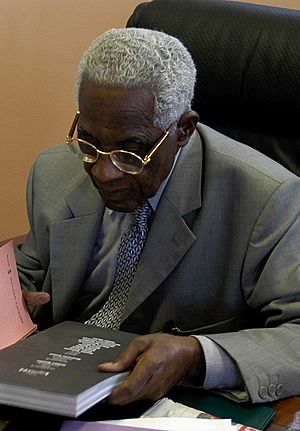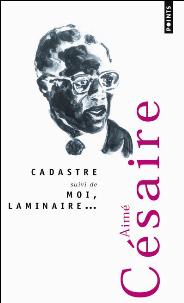Aimé Césaire facts for kids
Quick facts for kids
Aimé Fernand David Césaire
|
|
|---|---|

Aimé Césaire in 2003
|
|
| Born |
Aimé Fernand David Césaire
26 June 1913 Basse-Pointe, Martinique, Overseas France
|
| Died | 17 April 2008 (aged 94) Fort-de-France, Martinique, Overseas France
|
| Alma mater | École Normale Supérieure, University of Paris |
| Known for | Poet, politician |
| Political party | Martinican Progressive Party |
| Spouse(s) | Suzanne Roussi (m. 1937, div. 1963) |
Aimé Césaire (born June 26, 1913 – died April 17, 2008) was an important French poet, writer, and politician. He helped start the Négritude movement, which was about celebrating black identity and culture. He even created the word "négritude" in French.
Césaire founded the Parti progressiste martiniquais (Martinican Progressive Party) in 1958. He served in the French National Assembly (like the French parliament) for many years, from 1945 to 1993. He was also the head of the Regional Council of Martinique from 1983 to 1988.
Some of his famous works include the long poem Cahier d'un retour au pays natal (Notebook of a Return to the Native Land). He also wrote Une Tempête, which was his own version of Shakespeare's play The Tempest. Another important work was Discours sur le colonialisme (Discourse on Colonialism), an essay that talked about the struggles between people who colonize and those who are colonized. His writings have been translated into many different languages.
Contents
Early Life and Education
Aimé Césaire was born in Basse-Pointe, a town in Martinique, a French island in the Caribbean, in 1913. His father worked as a tax inspector, and his mother was a dressmaker. Even though his family was not wealthy, he learned to read and write.
To get a better education, his family moved to Fort-de-France, the capital of Martinique. There, Césaire could attend the only secondary school on the island, Lycée Victor Schœlcher. He later believed he was descended from the Igbo people of Nigeria.
Césaire then received a scholarship to study in Paris, France. He attended the Lycée Louis-le-Grand and later passed the entrance exam for the École Normale Supérieure in 1935.
Starting the Négritude Movement
While in Paris, Aimé Césaire, along with his friends Léopold Sédar Senghor and Léon Damas, started a literary magazine called L'Étudiant noir (The Black Student). In 1935, their writings in this magazine began the Négritude movement. This movement was very important for promoting African identity and pride, and it later played a big role in countries gaining independence from the French Empire in Africa.
In 1934, Césaire visited Kingdom of Yugoslavia and began writing his famous poem, Notebook of a Return to the Native Land. This poem was one of the first times the idea of Négritude was expressed. When he returned to Martinique in 1936, he continued working on this powerful poem. It described the complex life and culture of the Caribbean.
Teacher and Writer
In 1937, Césaire married Suzanne Roussi, who was also a student from Martinique. They moved back to Martinique in 1939 with their young son. Césaire became a teacher at the Lycée Schoelcher in Fort-de-France.
One of his students was Frantz Fanon, who became a very influential writer and thinker. Césaire was a great mentor and inspiration for Fanon. He also inspired another writer, Édouard Glissant.
World War II and Tropiques
During World War II, Aimé and Suzanne Césaire were very active intellectually. In 1941, they started a literary magazine called Tropiques. They wanted to challenge the way people thought about Martinican identity at the time. Césaire explained that he wanted Tropiques to help Martinicans think about their own environment and culture.
Even though he faced censorship, Césaire continued to speak out for Martinican identity. During the war, he also met the French surrealist poet André Breton. Breton was a big supporter of Césaire's work.
In 1947, Césaire's long poem Cahier d'un retour au pays natal was finally published as a book. It mixed poetry and prose to share Césaire's ideas about the cultural identity of black Africans under colonial rule. André Breton wrote a praising introduction for this edition, calling it "the greatest lyrical monument of our times." Césaire later said that Surrealism helped him find the writing style he was looking for.
Political Career
|
Aimé Césaire
|
|
|---|---|
| Deputy for Martinique (proportional representation) in the National Assembly of France, 4th Republic | |
| In office 21 October 1945 – 8 December 1958 |
|
| Preceded by | New Republic |
| Succeeded by | Self and others (5th Republic) |
| Parliamentary group | Communist(1945-1956) Independent (Non-Inscrit) (1956-1958) |
| Deputy for Martinique's 3rd constituency in the National Assembly of France | |
| In office 9 December 1958 – 1 April 1986 |
|
| Preceded by | self and others (proportional representation in 4th republic) |
| Succeeded by | self and others (proportional representation) |
| Parliamentary group | Independent(1958-1978) Socialist (Associated) (1978-1986) |
| Deputy for Martinique (proportional representation) in the National Assembly of France | |
| In office 2 April 1986 – 14 May 1988 |
|
| Parliamentary group | Socialist Group |
| Deputy for Martinique's 3rd constituency in the National Assembly of France | |
| In office 23 June 1988 – 1 April 1993 |
|
| Preceded by | self and others (proportional representation) |
| Succeeded by | Camille Darsières |
| Parliamentary group | Socialist Group |
| Personal details | |
| Political party | PCF PPM |
In 1945, Aimé Césaire was elected mayor of Fort-de-France and a representative for Martinique in the French National Assembly. He helped pass a law on March 19, 1946, that made Martinique a French "department" (like a state). However, this change didn't bring as many improvements as people hoped for.
Like many thinkers of his time, Césaire initially saw the Soviet Union as a symbol of progress. But he became disappointed after the Soviet Union put down the Hungarian revolution in 1956. He then left the French Communist Party.
In 1958, Césaire started his own political party, the Parti Progressiste Martiniquais. This party became very powerful in Martinican politics for the rest of the century. Césaire served as a deputy in the National Assembly for 47 years, finally stepping down in 1993.
His writings during this time showed his strong commitment to social issues. He wrote Discours sur le colonialisme (Discourse on Colonialism). This book criticized European colonization for its racism and unfairness. He also wrote Toussaint Louverture in 1960, about the leader of the Haitian Revolution. In 1969, he published Une Tempête, his version of Shakespeare's The Tempest for a black audience.
Césaire was also the President of the Regional Council of Martinique from 1983 to 1988. He retired from politics in 2001.
Later Life and Legacy
In 2006, Césaire refused to meet with Nicolas Sarkozy, who later became the President of France. This was because Sarkozy's political party had supported a law that required teachers to teach about the "positive role" of French presence abroad. Many people, including Césaire, felt this law praised colonialism. The controversial law was later removed by President Jacques Chirac.
Aimé Césaire passed away on April 17, 2008, after having serious heart problems. He was given a state funeral in Fort-de-France, Martinique, which was attended by French President Nicolas Sarkozy.
Legacy
Aimé Césaire's impact is still felt today. Martinique's airport was renamed Martinique Aimé Césaire International Airport in his honor in 2007. In 2011, a special ceremony was held in Paris, France, and a plaque with his name was placed in the Panthéon. This is a special building where many famous French figures are honored. He is also seen as a national hero in Martinique.
Césaire's poetry and ideas have had a huge influence on writers and thinkers, especially in postcolonial literature. His ideas about black unity and culture helped create new spaces for black voices. For example, his work inspired Frantz Fanon, who wrote Black Skin, White Masks. Césaire's writings were very important for understanding the effects of colonialism in France, its former colonies, and the Caribbean.
Works
Here are some of Aimé Césaire's important works:
Poetry
- 1939: Cahier d'un retour au pays natal (Notebook of a Return to the Native Land)
- 1946: Les armes miraculeuses (Miraculous Weapons)
- 1947: Cahier d'un retour au pays natal (new edition)
- 1948: Soleil cou-coupé (Cut-Throat Sun)
- 1950: Corps perdu (Lost Body)
- 1960: Ferrements (Chains)
- 1961: Cadastre (Land Register)
- 1982: Moi, laminaire (I, Laminaria)
- 1994: Comme un malentendu de salut ... (Like a Misunderstanding of Salvation...)
Theatre
- 1958: Et les Chiens se taisaient (And the Dogs Were Silent)
- 1963: La Tragédie du roi Christophe (The Tragedy of King Christophe)
- 1966: Une saison au Congo (A Season in the Congo) – a play about Patrice Lumumba
- 1969: Une Tempête (A Tempest) – adapted from Shakespeare's The Tempest
Other Writings
Discourse on Colonialism
Aimé Césaire's Discourse on Colonialism challenges the common ideas about colonizers and colonized people. In this text, he criticizes the idea that colonization is justified by saying "Christianity equals civilized, paganism equals savagery." He even compares white colonizers to "savages."
Césaire writes that "no one colonizes innocently." He believes that a country that colonizes is already "sick." He says that even if the people themselves are not bad, the act of colonization harms them.
Césaire's text connects slavery, imperialism, and capitalism, showing how they are all linked. He argues that these powerful forces worked together to hurt the colonized and give power to the colonizers. This was a very bold idea at the time.
He also explores how colonizers change. He says that by colonizing others, white men often lose touch with their true selves. They become brutal and develop a hatred for the people they colonize. He also looks at how colonialism affects the colonized, saying that it turns people into "things."
The text also talks about Nazism. Césaire blames the violence of colonialism for the rise of Hitler. He argues that Nazism was not a unique event in European history. Instead, he saw it as a natural outcome of a civilization that justified colonization without seeing the dangers of becoming savage. Césaire compared colonial violence to Nazism, saying that Europeans "tolerated that Nazism before it was inflicted on them... because, until then, it had been applied only to non-European peoples."
Césaire hoped that after World War II, Europe would move towards decolonization. He believed this was the way for Europe to escape the problems of both capitalism and communism. He thought that working with the "Third World" (developing countries) could help Europe find a new, more accepting path. He was also critical of new forms of control by powerful countries and American capitalism.
Césaire first wrote his text in French in 1950. Later, he worked with Joan Pinkham to translate it into English, which was published in 1972.
See Also
 In Spanish: Aimé Césaire para niños
In Spanish: Aimé Césaire para niños
- Créolité
- Antillanité
- Octave Mannoni


